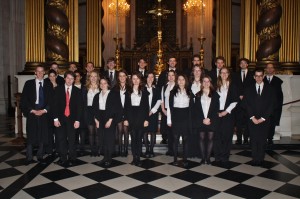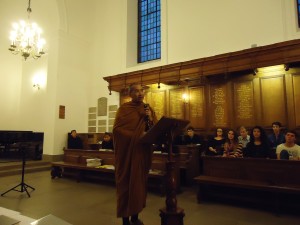Shaun Lambert, is Senior Minister of Stanmore Baptist Church, and part of the New Wine leader’s network. He is the author of A Book of Sparks, A Study in Christian MindFullness, published by Instant Apostle.
On Sunday 4th November, 2012, Shaun kindly gave this address in Somerville College Chapel.
Imagine that you are not in England on a cold autumn day, but that you are in Paris on a warm spring day. You are sitting in a street cafe, with someone you love beside you, perhaps your young children playing in the square in front of you. You have a cup of coffee, glass of beer or wine to savour slowly. It is a perfect doorway into the present moment, and present moment awareness which is mindfulness.
But you can’t enter that doorway because you are in a limited place, a place limited by anxiety, fear and stress. Your mind is elsewhere ruminating negatively about something in the past or something in the future.
Seven years ago I was in that place and unable to enter that beautiful doorway into the present moment, and the lives of those around me, because of stress.
Martin Laird (O.S.A.) in his beautiful book Into the Silent Land: The Practice of Contemplation says that in order to enter that doorway into the present moment, we need to be able to answer this riddle: Am I my thoughts and feelings? Are you your thoughts and feelings?
The central insight of mindfulness, and Buddhists, Christians and psychologists can all agree on this, is that we are bigger than our thoughts and feelings; they are discrete events in our minds. We can observe our thoughts and feelings and decentre from them. We might want to say from a Christian perspective that they are part of us, but they are not us.
This is very important because if we are totally identified with our thoughts, and see them as a direct readout of reality then we become the victim of our thoughts and not the witness of them. We react automatically to our thoughts rather than responding compassionately.
For example in Romans 12:2, Paul tells us, ‘Do not conform any longer to the pattern of this world, but be transformed by the renewing of your mind…’ Our thoughts and feelings are often shaped by our culture into narcissistic, competitive, fearful or consumerist patterns. This verse enables us to witness our thoughts, enables us to decentre from them.
Paul follows this up in 2 Corinthians 10:5, where he says, ‘take captive every thought to make it obedient to Christ.’ This verse also enables us to disarm our thoughts, notice them, but let them go.
Mindfulness is not about avoiding difficult reality, but about facing it head on.
Mark’s Gospel also tells us that we don’t see clearly. At the beginning of the Gospel Jesus tells people to repent, the word metanoiete is about having a new mind.
In Mark 4 there is a small kingdom parable which takes up the theme of the more famous ‘Seed and the Sower’ parable which it follows. It begins with the idea of bringing in a lamp, ‘Do you bring in a lamp to put it under a bowl or a bed?’ (Mark 4:21)
The lamp, like the seed, refers to the Word of God. Psalm 119:105 says ‘Your word is a lamp to my feet and a light for my path.’ In the one reality we all experience there is a hidden spiritual dimension. One day says Jesus what is hidden will be revealed (v.22). As biblical scholar Joel Marcus says, Jesus lifts the curtain on the End, a universe filled with light, and then closes the curtain again.
Because of the hidden nature of this spiritual reality Jesus’ constant refrain is, ‘If anyone has ears to hear, let him hear’ (Mark 4:23). That is a clue to us that our perceiving of reality is not automatic, or necessarily right.
Jesus underlines this in the next verse (v.24) which reads literally in the Greek, ‘See what you hear.’ The Greek word here is blepete which is used repeatedly throughout Mark’s Gospel as a word about watchfulness, and spiritual perception.
It was contemplative practices seven years ago that enabled me to find the doorway to present moment awareness and to decentre from my afflictive thoughts and feelings. Soon after that day in Paris, whilst on sabbatical, a small book called The Jesus Prayer by Simon Barrington Ward, former Bishop of Coventry, leapt off the shelf at me.
This ancient, repetitive, contemplative prayer, said with the breath goes, ‘Lord Jesus Christ Son of God, have mercy on me a sinner.’ It enabled me to decentre from my anxious thoughts, and enter into the healing presence of God.
At the same time I was studying counselling and psychotherapy at Roehampton University, and came upon mindfulness in psychology. Mindfulness as present moment awareness is a universal human capacity, and it can be arrived at through mindful awareness or meditative practices. Within modern psychology these practices have Buddhist roots, but are not religious or spiritual but entirely reality focused. They include attending to your breath, the mindful eating of a raisin, and mindful walking.
But there are other practices that bring us into a state of mindfulness. These include poetry. Daniel Siegel, interpersonal neurobiologist did some work with the Irish Catholic scholar/philosopher/poet John O’Donohue. Daniel Siegel says that ‘poets have found a way to use words to free our minds, to clear our vision, to create mindfulness in the moment.’
One of the elements in this is the ambiguity of the words in poetry. The riddles and parables of Jesus have the same effect on their hearers.
Nature poets and writers have the same mindful attentiveness and awareness. Miriam Darlington in her book Otter Country: in search of the wild otter, becomes the otter as she writes: ‘In a last sliver of reflected light, something on the water distracts me. It’s moving like an animal but made out of liquid. It ripples for a moment and leaves the hint of a wake. A long mud-brown slither slowly becomes more creature than branch. I see a smooth head; the contours of a brown face with ears, whiskers and the dark holes of two nostrils flowing purposefully downstream. The barely perceptible bump of its dive and a lingering tail-tip convince me. An otter. So strange and subtle that I could almost have imagined it.’ (pp. 73-74)
She also mindfully notices that otters like to make their holts (dens) under ash trees…
Present moment awareness is part of Christian mindfulness, as is decentring from our thoughts. Jesus goes on to give us another important insight in the next verses, Mark 4: 24-25.
‘With the measure you use it will be measured to you – and even more. Whoever has will be given more, whoever does not have, even what he has will be taken from him.’
Here Jesus brings together the two main themes of chapter 4, the good soil of the attentive listener, and the insight and revelation that comes from attending to the Word.
The more attentive you are as a listener (the measure you use), the more insight and revelation (it) you receive. Attentive listening to the Word is part of Christian mindfulness. But, as biblical scholar Joel Marcus points out, this is divine overcompensation. Like Emily Dickinson’s poem number 323:
As if I asked a common Alms,
And in my wondering hand
A Stranger pressed a kingdom
And I, bewildered stand –
We don’t control this; there are no techniques to control God and His kingdom. We can only put ourselves in the right place.
In Mark’s Gospel that is the place of silence, solitude and listening to God as mirrored for us by Jesus the contemplative.
‘Very early in the morning, while it was still dark, Jesus got up, left the house and went off to a solitary place, where he prayed.’ (Mark 1:35)
We are to put ourselves in the ‘unlimited place where God is,’ to use Olivier Clement’s phrase. More than that, the outrageous claim of Christianity is that we can become the unlimited place where God is. Not that we can become God, but that we can become like His Son, Christ-like. We can be filled with all the fullness of God (Ephesians 3:19). This is Christian MindFullness.
Emily Dickinson’s poem continues:
As if I asked the Orient
Had it for me a Morn—
And it should lift its purple Dikes,
And shatter me with Dawn!
At the end of the Gospel of Mark the women go to contemplate the empty tomb, and meet an Angel, a messenger of God. The angel enables them to see reality through the eyes of God. Contemplation says, Enzo Bianchi, founder of the Bose Community, is seeing through the eyes of God.
The new dawn of the resurrection and the reality of the empty tomb shatter the women disciples. They leave filled with numinous awe, trembling and bewildered, full of ekstasis, from which we get our word ecstasy.
They are silent. The cross and the resurrection, says Mark, is the place of the fullest insight and revelation. It is the place where our limited humanity is drawn into the unlimited love of God. This is Christian mindFullness.
http://shaunlambert.co.uk/a-book-of-sparks/

